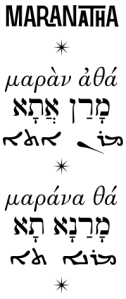 Advent is well come nigh! A truth calendrical and etymological. So, I thought I might delve into one obscure word in this season’s vocabulary.
Advent is well come nigh! A truth calendrical and etymological. So, I thought I might delve into one obscure word in this season’s vocabulary.
The word ‘Maranatha‘ appears in I Corinthians 16.22 and Didache 10.6. Respectively:
εἴ τις οὐ φιλεῖ τὸν κύριον, ἤτω ἀνάθεμα. μαράνα θά.
If anyone does not love the Lord, let them be anathema. Marana tha.
ἐλθέτω χάρις καὶ παρελθέτω ὁ κόσμος οὗτος. Ὡσαννὰ τῷ θεῷ Δαυείδ. εἴ τις ἅγιός ἐστιν, ἐρχέσθω· εἴ τις οὐκ ἔστι, μετανοείτω· μαρὰν ἀθά· ἀμήν.
May grace come and this world pass away. Hosanna to the God of David. If anyone is holy, let them come; if anyone is not, let them repent; maran atha; amen.
It is an Aramaic phrase (although Luther tried to twist it into a totally different Hebrew phrase — מָחֳרַם מָוְתָה māḥăram mothâ, ‘devoted to death’). It was once thought to be a curse word, associated to its preceding anathema in the I Corinthians verse, but is clear that the ancient authors who promoted this interpretation had a rather hazy understanding of the phrase. However, that verse is part of Paul’s concluding prayer for the Corinthians, and forms a rather disjointed collection of prayed aphorisms:
- All the brethren send greetings.
- Greet one another with a holy kiss.
- I, Paul, write this greeting with my own hand.
- If anyone does not love the Lord, let them be anathema.
- Maranatha.
- The grace of the Lord Jesus be with you.
- My love be with all of you in Christ Jesus. Continue reading “Maranatha!”

